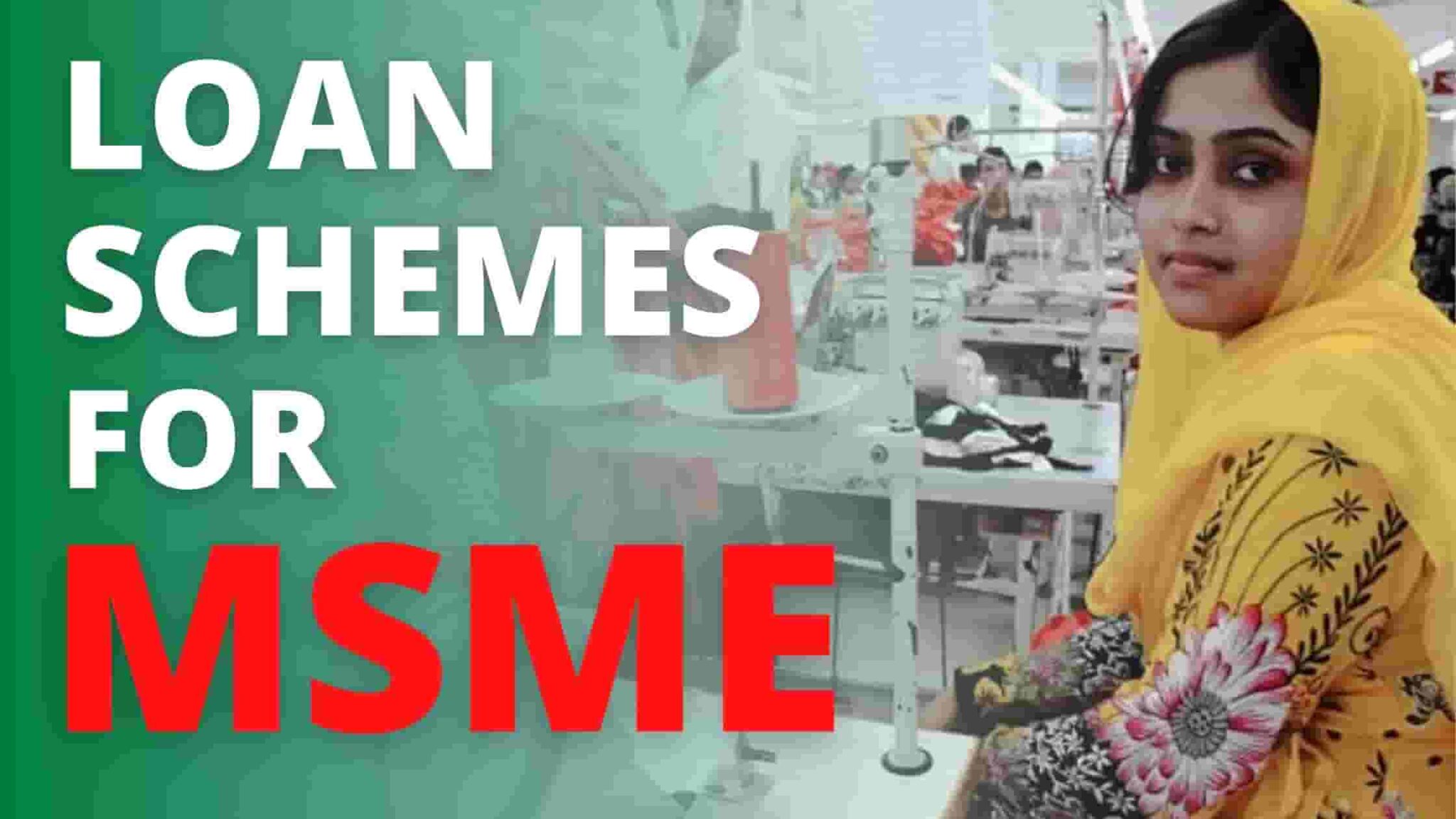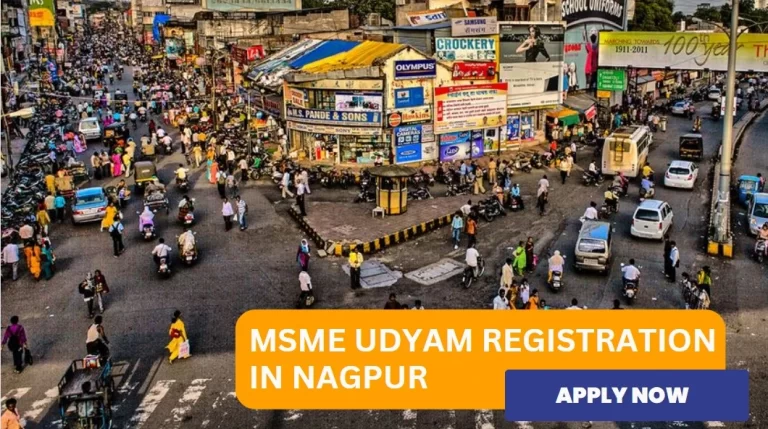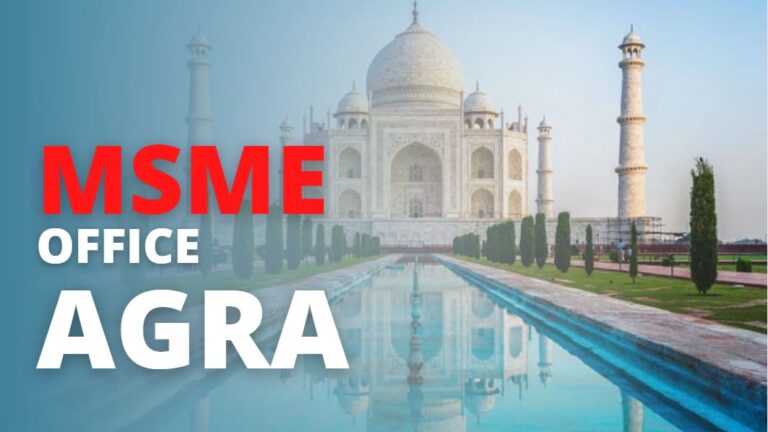In this article understand the msme loan scheme in detail and how to choose the scheme and apply for a loan for your business.
Micro, small, and medium-sized businesses (MSMEs) require capital to start and expand. To offer loans to MSMEs, the Indian government has taken several efforts and created numerous programmes. MSMEs provide a major contribution to our country’s economic development. Access to finance is one of the most important features of MSMEs. MSMEs require loans or financing to start a firm or expand an existing one.
Let us understand a few common things about the MSME loan scheme.
We are available to answer your questions. Send us a WhatsApp message and we’ll respond as soon as we’re available! Send us a WhatsApp message.
What is MSME Loan?
Micro, Small and Medium Enterprise (MSME) loan is a type of business loan provided by financial institutions to people, MSMEs, and startup businesses with the aim of expanding their businesses and promoting the MSME sector. MSME loan schemes are primarily utilised by company owners and companies to satisfy their working capital needs, manage or enhance cash flow, and expand their businesses, among other things. Most banks and non-bank financial institutions (NBFCs) offer MSME loans without requiring collateral or security from borrowers.
Compare MSME Loan Interest Rates – 2024
| Lenders | Interest Rate |
| SBI | 8.30% onwards (SME Loan) |
| Kotak Mahindra Bank | 15% onwards |
| Axis Bank | 15% onwards |
| HDFC Bank | 16% onwards |
| FlexiLoans | 16% onwards |
| Fullerton Finance | 17% onwards |
| ICICI Bank | 18% onwards |
| Lendingkart Finance | 18% onwards |
| ZipLoan | 18% onwards |
| IIFL Finance | 18% onwards |
| Hero Fincorp | 18% onwards |
| Indifi Finance | 18% onwards |
| NeoGrowth Finance | 18% onwards |
| Tata Capital Finance | 18% onwards |
| RBL Bank | 19% onwards |
| SMEcorner | 20% onwards |
| IDFC First Bank | 20% onwards |
| HDB Financial Services Ltd. | 22% onwards |
| PNB Business Loan | Based on your Business’s Profile |
| Bank of Baroda | Based on your Business’s Profile |
Note: The interest rates listed are subject to change and are determined solely by the bank, NBFC, and RBI.
MSME Loan – Features, Fees & Interest Rates
| Interest Rate | Depends on applicant’s profile and business requirements |
| Loan Amount | Minimum Limit to borrow is Rs. 30,000 and Maximum is up to Rs. 1 crore, can exceed as per business requirements |
| Repayment Tenure | From 12 months – 5 years |
| Collateral | Not required for Unsecured Business Loans |
| Processing Fee | From Nil to 4% of the loan amount |
| Foreclosure Charges | From Nil to 5% of the outstanding principal amount |
| Part-payment Charges | From Nil to 4% of the outstanding principal amount |
| Loan Cancellation Charges | Varies from bank to bank |
| Subsidy | Offered by selected financial Institutions |
| Credit Facilities | Working Capital Loan, Bill discounting, Overdraft, Cash Credit, Letter of Credit, Bill of Purchase, Merchant Cash Advance, etc. |
Note: That all of the aforementioned interest rates, fees, and levies are subject to change at the bank/and NBFC’s RBI’s sole discretion. The charges will be subject to additional taxes such as GST and service tax.
MSME Loans under Government Schemes – 2024
Various banks and NBFCs provide Micro, Small and Medium Enterprises (MSMEs) SME/MSME programmes launched by the Ministry of MSME. The following are some of the most popular MSME programmes given by financial institutions and started by the Indian government:
The Indian government has devised a number of lending schemes & programmes to give credit to MSMEs, and the banking industry and financial institutions also lend to them.
- Pradhan Mantri Mudra Yojana (PMMY)
- Prime Minister’s Employment Generation Programme (PMEGP)
- Credit Guarantee Trust Fund for Micro & Small Enterprises (CGT MSE)
- Credit Linked Capital Subsidy Scheme (CLCSS)
- Equity Infusion for MSMEs through Fund of Funds
- SIDBI Make In India Loan For Enterprises (SMILE)
- MSME Business Loan for Startups in 59 Minutes
The following are some of the most well-known MSME financing plans for 2024, which have become popular as a result of business disruptions caused by COVID-19.
Pradhan Mantri Mudra Yojana (PMMY)
On April 8, 2015, the Honourable Prime Minister inaugurated the Pradhan Mantri Mudra Yojana (PMMY) initiative. Non-corporate and non-farm small or micro-enterprises can apply for loans of up to ten lakh under this plan. PMMY classifies these loans as MUDRA (Micro Units Development and Refinance Agency Limited) loans.
MUDRA is a non-banking financial institution (NBFI) that promotes the growth of SMEs. MUDRA assists banks, microfinance institutions (MFIs), and non-bank financial companies (NBFCs) in refinancing loans to micro units with credit requirements of up to ten lakhs. Commercial banks, small finance banks, MFIs, and NBFCs make loans under this plan.
Borrowers can apply for loans at any of these lending institutions or through the UdyamiMitra site.
There are three separate schemes under the PMMY scheme: ‘Shishu,’ ‘Kishore,’ and ‘Tarun,’ which indicate the stage of development or growth, as well as the financial needs of the beneficiary micro-units or entrepreneurs, and also serve as a reference point for the next phase of graduation or growth.
Nature of Assistance – ‘Shishu’ provides loans up to Rs.50,000. ‘Kishor’ offers loans ranging from Rs.50,000 to Rs.5 lakhs. Micro-units can get loans from ‘Tarun’ that range from Rs.5 lakhs to Rs.10 lakhs.
Prime Minister’s Employment Generation Programme (PMEGP)
The Prime Minister’s Employment Generation Programme (PMEGP) combines the Prime Minister’s Rojgar Yojna (PMRY) with the Rural Employment Generation Programme (REGP) (REGP). This programme aims to provide jobless youth and traditional craftsmen with self-employment possibilities in the non-farm sector by establishing micro-enterprises. It is implemented by the Khadi and Village Industries Commission (KVIC), which serves as the national nodal body for this initiative.
The State KVIC Directorates, District Industries Centres (DICs), State Khadi and Village Industries Boards (KVIBs), and banks are in charge of implementing the plan at the state level.
The KVIC uses this method to channel government subsidies through authorised banks, where they are eventually disbursed directly to enterprises or recipients’ bank accounts.
Eligibility – Any individual or individuals above the age of 18 are eligible. For projects in the manufacturing sector costing more than Rs.10 lakh and in the commercial or service sector costing more than Rs. 5 lakh, the individual/s must have at least an VIII grade pass.
Only new projects are assessed for approval under this plan. Self-help groups, institutions established under the Societies Registration Act of 1860, production-based cooperative societies, and charitable trusts are all eligible.
Any unit/s that are currently participating in PMRY, REGP, or any other plan run by the Government of India or a state government are ineligible. Even units that have previously received Government Subsidy under any other plan run by the Government of India or a state government are ineligible.
Nature of Assistance – The maximum cost of a project or unit acceptable for assistance under this plan is Rs.25 lakhs in the manufacturing sector and Rs.10 lakhs in the business or service sector.
In urban regions, the beneficiary rate of the subsidiary for the general category is 15%, whereas in rural areas, it is 25%. In urban regions, the beneficiary rate of the subsidiary for the special category is 25%, while in rural areas, it is 35%.
Credit Guarantee Trust Fund for Micro & Small Enterprises (CGT MSE)
The Credit Guarantee Fund Trust for Micro and Small Enterprises was formed by the Ministry of Micro, Small and Medium Enterprises and the Small Industries Development Bank of India (SIDBI) (CGTMSE). The CGTMSE was formed in order to put in place a credit guarantee system for MSMEs.
The Government of India and SIDBI both contribute to the scheme’s fund. The goal of this trust is to provide financial support to small and medium-sized businesses without requiring any third-party guarantees or collateral. Under this plan, guarantee coverage varies from 85% for Micro Enterprises (up to Rs 5 lakh), to 75% for others, and 50% for retail activities.
Eligibility — The initiative is open to both current and new businesses. Candidates who fulfil the eligibility requirements can approach banks or financial institutions and choose from a list of Regional Rural Banks that are eligible for assistance under this plan.
Nature of Assistance – The guarantee cover provided under the plan is 50 percent, 75 percent, 80 percent, or 85 percent of the credit facility’s sanctioned amount. The level of guarantee protection for micro-enterprises up to 5 lakhs is 85 percent.
For loan between 10 lakhs and 100 lakhs per MSME borrower for retail commercial activity, the guarantee cover is 50 percent of the sanctioned amount of the credit facility. In the event of default, the trust pays up to 75% of the amount owed under the credit facility, which is granted by the lending institution for credit amounts up to 200 lakh.
Credit Linked Capital Subsidy Scheme (CLCSS)
MSMEs receive a subsidy for technological upgrades under the Credit Linked Capital Subsidy Scheme (CLCSS). MSMEs can get a 15% subsidy on extra investments up to Rs.1 crore for technological upgrades under this plan. Induction of state-of-the-art or near-state-of-the-art technology is referred to as technology upgradation.
Candidates who satisfy the qualifying requirements can apply for the subsidy through one of 12 nodal banks or organisations. SIDBI, NABARD, SBI, BoB, PNB, BOI, SBBJ, TIIC, Andhra Bank, Corporation Bank, Canara Bank, and Indian Bank are the 12 nodal banks or agencies.
Eligibility – This initiative is open to any MSME unit. However, under this programme, units that replace current equipment or technology with the same equipment or technology will not be eligible for a subsidy. Likewise, units modernising with old machinery would be ineligible for this programme.
Nature of Assistance – This programme seeks to help MSMEs upgrade their technology by offering a 15 percent upfront capital subsidy on institutional financing. This subsidy is given to MSMEs to help them implement well-established and enhanced technology in specific sub-sectors or goods that have been approved under the plan.
For selected sectors/sub sectors/technologies, this plan gives an upfront subsidy of 15% on institutional loans up to Rs.1 crore (i.e. a subsidy ceiling of Rs.15 lakh).
Equity Infusion for MSMEs through Fund of Funds
MSMEs confront a serious lack of capital. Early-stage funding is provided by venture capital (VC) and private equity (PE) companies, whereas growth-stage investment is provided by a small number of them. The Fund of Funds offers equity capital to MSMEs with development potential and viability in order to assist them to expand and get listed on stock markets.
With government participation, this plan would be able to channel various forms of financing into neglected MSMEs and fulfil the rising demands of viable and high-growth MSMEs.
Eligibility – All MSMEs are eligible. MSMEs can apply through Investor Funds onboarded and registered with the proposed Fund of Funds.
Nature of Assistance – The Government of India will support VC or PE firms in investing in commercially viable MSMEs for meeting their growth requirements. The proposed fund of funds will encourage private sector investments in the MSME with leverage of Rs.50,000 crore.
Credit Guarantee Scheme for Subordinate Debt (CGSSD)
The Credit Guarantee Scheme for Subordinate Debt (CGSSD) aims to assist the promoters of operating MSMEs that are stressed and have become non-performing assets (NPA) as of April 30, 2020. The promoters would then invest this money as equity in the MSME business, increasing liquidity and maintaining the debt-equity ratio.
Subordinate debt will be a big assistance in keeping and reviving MSMEs that have gone bankrupt or are about to go bankrupt. MSMEs’ promoters will be granted credit amounting to 15% of their share (equity plus debt), or Rs.75 lakh, whichever is lower.
Eligibility — This programme is open to operating MSMEs that are either non-performing assets (NPAs) or are under stress. This initiative is open to MSME promoters who satisfy the eligibility requirements. They can take advantage of the plan by approaching scheduled commercial banks.
Nature of Assistance – The programme offers a 90% guarantee for the sub-debt, with the remaining 10% coming from the promoters involved. The maximum payback period is ten years. Payment of the principal is suspended for a period of seven years.
SIDBI Make In India Loan For Enterprises (SMILE)
The SIDBI Make In India Loan For Enterprises (SMILE) programme is designed to enable MSMEs to participate in the government of India’s “Make in India” initiative. This plan offers a soft loan that is similar to quasi-equity. It also offers MSMEs term loans with favourable terms to help them achieve the debt-to-equity ratio necessary for their establishment. It also offers loans to current MSMEs to help them seek development possibilities.
Eligibility — This programme covers new businesses in the manufacturing and service sectors. Existing businesses that are expanding to take advantage of new developing possibilities are eligible for this programme. This plan will also support existing businesses that are expanding for the purpose of modernisation, technology upgrade, or other initiatives that will help them develop their firm. The focus of this programme is on funding small businesses in the MSME sector.
Nature of Assistance – For equipment and financing, the minimum loan amount is Rs.10 lakh. Others must take out a loan of at least Rs.25 lakh. The payback duration is up to ten years, with a 36-month moratorium included.
MSME Business Loan for Startups in 59 Minutes
The Indian government has stated that it will provide MSME Business Loans for Startups in 59 Minutes. A new web platform has been created to assist MSMEs with loans in as little as 59 minutes. This online portal’s loan processing for MSMEs is completely automated. The loans will be processed within one hour using this site. The loan is disbursed to the loan applicant in seven or eight working days after it has been authorised through this site.
This programme intends to automate and digitise the numerous procedures associated with company loans, such as term loans, working capital loans, and mudra loans.
Eligibility – Any current firm or MSMEs that wishes to apply for an in-principle approval on a business loan (term loan/working capital loan) is eligible. The company must be computerised and have a six-month bank statement facility.
Businesses that are GST registered as well as those that are not are both eligible. If a firm that is not GST registered, has not filed an ITR, or does not have a bank statement asks for a mudra loan, the business can self-declare the relevant information.
Borrowers’ qualifying requirements are determined by their income or revenue, repayment ability, current credit facility, and any other reasons determined by lenders. The portal is linked to CGTMSE, which allows borrowers to check their eligibility.
Nature of Assistance – In-principle approvals for business loans range from Rs.1 lakh to Rs.5 crores. Loans are available with or without collateral. Interest rates begin at 8.5 percent and go up from there. In-principle approvals for mudra loans range from Rs.10,000 to Rs.10 lakh.
MSME Loan Scheme by Banks
MSMEs can get term loans and working capital loans from banks and other lending institutions. Banks provide working capital loans to SMEs to help them meet their daily financial needs. MSMEs can use term loans to fund capital growth, capital expenditure, or the purchase of fixed assets.
Aside from term loans and working capital loans, banks and financial institutions provide a variety of lending programmes to MSMEs. Different banks or financial institutions provide varying MSME lending plans with different terms and conditions.
The interest rates on each loan programme given by banks/financial institutions varies. The interest rates are determined by a number of criteria, including the amount of the loan, the payback period, the kind and duration of the business, creditworthiness, and repayment capacity.
Banks give several MSME loans without requiring collateral. State Bank of India, HDFC Bank, ICICI Bank, Axis Bank, and others are some of the institutions that provide various lending plans. Financial institutions that lend to MSMEs include NBFCs, Small Finance Banks (SFBs), Regional Rural Banks (RRBs), and Micro Finance Institutions.
If you have a good credit score, you can get a low-interest MSME loan very easily.
MSME Loans Have a Purpose
- To fulfil the needs for working capital
- For the growth of new and established businesses
- To keep track of a company’s cash flow
- To purchase or install new equipment or machinery To purchase raw materials, cars, tools, and other similar items
- to replenish inventory
- To pay rent, salary, hire and train employees, and much more.
New MSME Scheme Categorization
The distinction between manufacturing and service businesses has been eliminated by lowering the investment amount and yearly turnover for both types of businesses.
| MSME – Merged Criteria: Investment and Annual Turnover | |||
| Sector/Enterprise Type | Micro Enterprise | Small Enterprise | Medium Enterprise |
| Manufacturing & Services Sector, Both | Investment less than Rs. 1 crore Turnover less than Rs. 5 crore | Investment less than Rs. 10 crore Turnover up to Rs. 50 crore | Investment less than Rs. 50 crore Turnover up to Rs. 250 crore |
MSME Loan Eligibility Criteria
- 1 year of business experience is required.
- Business Turnover: For established businesses, a minimum of Rs. 12 lakh is required, however this varies per bank.
- Financial stability and a good repayment history
Entities that are eligible to apply for an MSME loan include:
Individuals, SMEs, MSMEs, business owners, women entrepreneurs, self-employed professionals, and people from the SC/ST/OBC categories are also eligible. Private or public limited companies, sole proprietorships, partnership firms, and limited liability partnerships engaged solely in trading, services, or manufacturing are also eligible.
Documents Needed to Apply for an MSME Business Loan
- Application form filled out completely with passport-sized photos
- Passport, Aadhar card, Voter’s ID card, Driving License, PAN Card, and Utility Bills are examples of KYC papers for applicants and co-applicants (Telephone, Electricity)
- Proof of Income and Business Address
- Bank statement over the last six months, as well as bank account information
- Certificate of Business Establishment Proof of SC/ST or OBC status, if applicable
- MSME Udyam registration certificate
- Complete business Project report of your company
- Any further documents that the bank/NBFC requires
Disclaimer: The information included below is given only for educational reasons. When you access or utilise the site or the information, no attorney-client relationship is formed. This site’s content does not represent legal or professional advice, and it should not be used for that purpose or as a substitute for legal counsel from a licenced attorney in your state.
We are available to answer your questions. Send us a WhatsApp message and we’ll respond as soon as we’re available! Send us a WhatsApp message.
FAQs on MSME Loans
Is a credit score required for MSMEs to obtain a loan?
Yes, when applying for MSME loans, having a strong credit score of above 750 is usually advantageous.
Is MSME Udyam registration optional or mandatory?
MSME Udyam registration is mandatory, and firms choose to do so in order to take advantage of the benefits it provides.
What is the maximum credit amount available under MSME schemes?
MSME’s business loan amount ranges from Rs. 30,000 to Rs. 1 crore (collateral-free loans); however, the amount may surpass this depending on the firm’s needs.
How can I receive an MSME loan with no collateral?
If you need a collateral-free loan for a small firm or a startup, you’ll need to apply for an unsecured business loan.
Is there a cap on how much money MSME Schemes may make?
The lender determines the minimum yearly turnover limit, which varies from application to applicant.
Is it possible to get a loan for machinery for a small business?
Yes, a machinery loan is a form of business credit given to MSMEs and entrepreneurs by a variety of banks and NBFCs.
What is the interest rate on SBI’s MSME loan?
SBI’s MSME loan interest rate starts at 8.30 percent and goes up from there.
How much does it cost to register as an MSME?
MSME registration is no cost, and getting an MSME certificate from a private consultancy will charge small fees for the service.
Who may apply for an MSME/SME loan?
Self-employed professionals, entrepreneurs, company owners, micro-small and medium businesses, sole proprietorships, partnership firms, limited liability partnerships (LLP), and others can apply for MSME loans.
How can I get a 59-minute MSME loan?
To apply for an MSME loan online in 59 minutes, go to psbloansin59minutes.com, a government of India programme that grants business loans in just 59 minutes after submitting an application form.
Is GST a requirement for MSME loans?
Yes, for current MSME and salaried professionals who want to establish a new firm, the previous year’s GST return is required.
How long is the Provincial Registration Certificate (PRC) valid?
A Provincial Registration Certificate (PRC) is valid for five years.
Is the MSME Udyam certificate still valid?
The MSME udyam certificate is valid for lifetime.
We are sure you’ve found out few things on MSME loan schemes, as well as the advantages and differences. Please contact us using the contact form if you have any more queries regarding MSME Udyam Registration online.
Follow us on Google News for the latest updates on Startups / finance/ MSME / Insurances.




